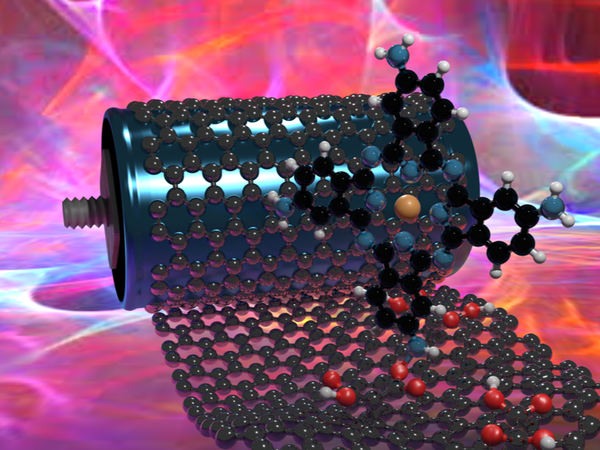A new two-dimensional graphene derivative has been developed by scientists from the Regional Centre of Advanced Technologies and Materials (RCPTM) at Palacký University Olomouc. They claim that the material could be used for the development of supercapacitors, electrical energy storage devices, which could overcome the weaknesses of today’s batteries and condensers. The research, the findings of which were published in the journal Advanced Functional Materials, should continue with the construction of a supercapacitor prototype.
The development of a new carbon material is one of the important achievements of a prestigious European research Council (ERC) grant, which has been investigated in the science centre for two years under the supervision of Michal Otyepka. Seven years ago, the physical chemist participated in the discovery of the thinnest insulator in the world, fluorographene, which became the basis for many achievements by the Olomouc investigators. The chemistry of this graphene’s younger brother, in whose hexagon structure a fluorine atom is bound to every carbon atom, has been studied by Olomouc scientists ever since. Although fluorographene was considered chemically inert, they have shown that it is suitable for the development of a large number of graphene derivatives. By the exchange of fluorine for another functional group, scientists can give the material new properties required for specific applications.
“Once again, we started with fluorographene and created its derivative by adding a molecule of phthalocyanine by chemical bonding to its two-dimensional skeleton. We have managed to develop a material which carries both a positive and a negative electrical charge in every functional group, a dipolar ion called zwitterion, which is electrically neutral as a whole. Thus we created an organised network of charges on the surface of fluorographene. Such surfaces are very convenient for charge transport and separation, so their application in supercapacitors for energy storage suggests itself,” explained Otyepka.
The development of such electrical energy “stores” is intensely investigated by many scientific teams in the world since the demand for them is very high. Today’s standard batteries have great capacity, but it takes a rather long time to recharge them, which has been a major drawback with electric vehicles. On the other hand, there exist capacitators that can be recharged quickly, but their capacity is relatively limited. Supercapacitors are devices with the advantages of both batteries and capacitors – they are able to have great capacity and charge fast.
“The graphene derivative we have developed is suitable for this application. It has great stability, good conductivity, and its capacitance does not decrease even after a high number of charging cycles. Moreover, the proposed system, owing to the benign Na2SO4 electrolyte, is safe. Our goal now is to acquire a material with even greater energy density, i.e. the amount of stored energy, and the subsequent step will be to prepare a prototype of a supercapacitor which could utilise this material,” added Otyepka. According to him, this type of material has been developed in RCPTM for the first time. Its utilisation will be possible in all devices where energy needs to be stored – from mobile phones to electric vehicles.
The present achievements by RCPTM have interested some scientific stars in the field. Possible collaboration has been discussed with the material chemist Niyazi Sarıçiftçi from Johannes Kepler University in Linz, Austria, and the possibility of interlinking their knowledge with a leading expert in the field of two-dimensional MXenes, Yuri Gogotsi from Drexel University in Philadelphia, is also under discussion.
